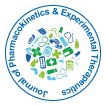Notre groupe organise plus de 3 000 séries de conférences Événements chaque année aux États-Unis, en Europe et en Europe. Asie avec le soutien de 1 000 autres Sociétés scientifiques et publie plus de 700 Open Access Revues qui contiennent plus de 50 000 personnalités éminentes, des scientifiques réputés en tant que membres du comité de rédaction.
Les revues en libre accès gagnent plus de lecteurs et de citations
700 revues et 15 000 000 de lecteurs Chaque revue attire plus de 25 000 lecteurs
Indexé dans
- Recherche de référence
- Université Hamdard
- EBSCO AZ
- Publons
- ICMJE
Liens utiles
Revues en libre accès
Partager cette page
Abstrait
The Role of ABC Efflux Transporter in Treatment of Pharmaco-Resistant Schizophrenia: A Review Article.
Alemayehu D, Melisie G, Taye K and Ta
A large percentage of schizophrenic patients respond poorly to antipsychotic treatment. This could be explained by inefficient drug transport across the blood-brain barrier due to ABC efflux transporter, in particular, P-glycoprotein, mediated efflux. P-glycoprotein (P-gp) activity and expression in the blood-brain barrier can be affected by genetics (polymorphism), inflammation and pharmacotherapy. The level of expression of P-gp at BBB is thought to be one of the factors contributing for pharmaco-resistant schizophrenia. Despite the differences in the experimental set-up that partly explain the controversies regarding the interaction between P-gp and antipsychotics, it is feasible to say that the majority of the antipsychotics have shown (mostly weak) affinity as a P-gp substrate and that most have a weak inhibitory effect on P-gp in vitro. The three major Single Nucleotide Polymorphisms (SNPs) in protein coding region at C3435T, G2677T, and C1236T of ABCB1 at BBB have been associated with efflux pump efficiency and with predicting changes in the function of P-gp that determines the inter-cerebral concentration and therapeutic response in human studies to anti-psychotics unlike serum concentration of these agents.
Revues par sujet
- Agriculture et Aquaculture
- Biochimie
- Chimie
- Food & Nutrition
- Génétique et biologie moléculaire
- Géologie et sciences de la Terre
- Immunologie et microbiologie
- Ingénierie
- La science des matériaux
- Le physique
- Science générale
- Sciences cliniques
- Sciences environnementales
- Sciences médicales
- Sciences pharmaceutiques
- Sciences sociales et politiques
- Sciences vétérinaires
- Soins infirmiers et soins de santé
Revues cliniques et médicales
- Allaitement
- Anesthésiologie
- Biologie moléculaire
- Cardiologie
- Chirurgie
- Dentisterie
- Dermatologie
- Diabète et endocrinologie
- Gastro-entérologie
- Immunologie
- La génétique
- Maladies infectieuses
- Médecine
- Microbiologie
- Neurologie
- Oncologie
- Ophtalmologie
- Pédiatrie
- Recherche clinique
- Soins de santé
- Toxicologie

 English
English  Spanish
Spanish  Chinese
Chinese  Russian
Russian  German
German  Japanese
Japanese  Portuguese
Portuguese  Hindi
Hindi